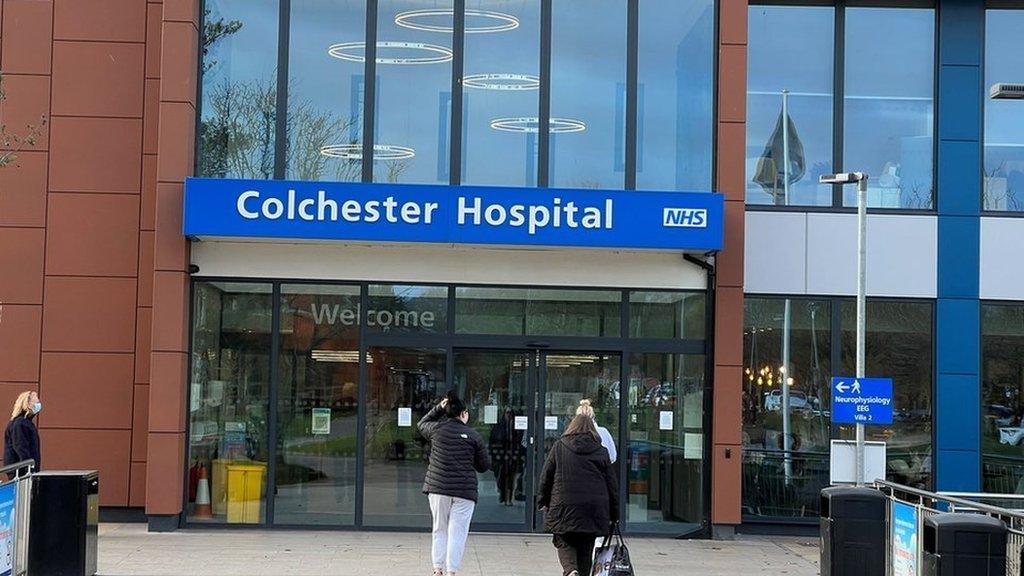Ipswich and Colchester hospitals merger a success five years - chief exec
- Published
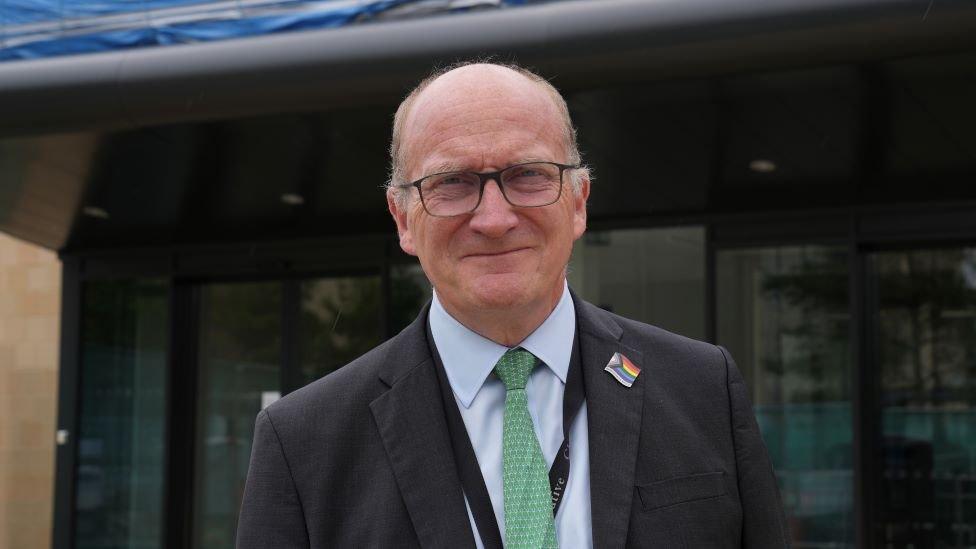
Nick Hulme believes the merger has allowed for a better outcome for patients over the last five years
A merger between two hospitals has been a "significant success", the trust's chief executive has said.
Ipswich and Colchester combined services on 1 July 2018 creating the East Suffolk & North Essex NHS Foundation Trust (ESNEFT) .
Nick Hulme, chief executive, said he "genuinely believes it has led to better outcomes" for patients.
The union Unison said there was a "disconnect between staff at both sites".
Mr Hulme said the merger had saved services like radiotherapy which might otherwise have moved out of the area.
Instead the trust is now starting microwave ablation therapy, which is a specialist treatment for kidney and liver cancers that limits the amount of radiation a patient is exposed to.
The chief executive credited the flexibility and variety of services within the trust as a reason for what he said was one of the lowest vacancy rates at any NHS trust across England.
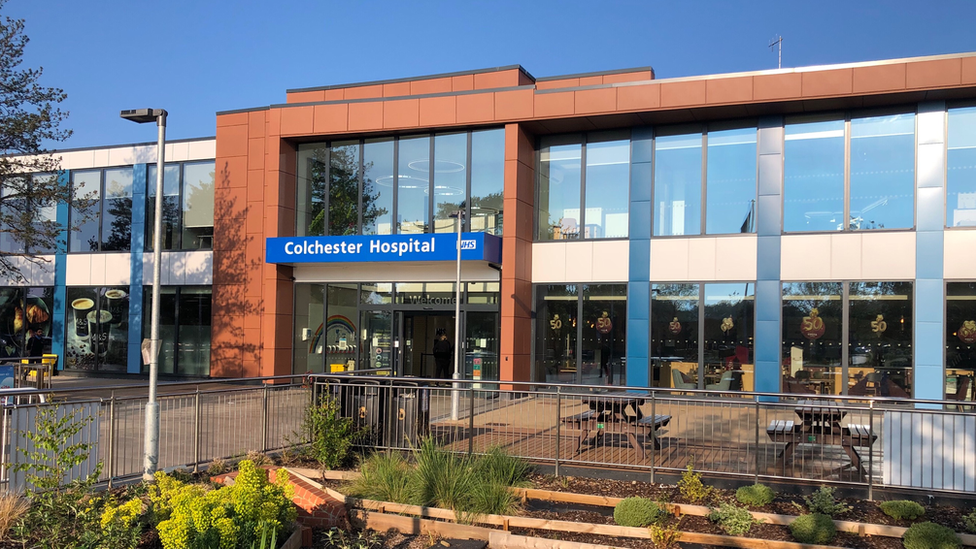
The union Unison has been critical of support services work at Ipswich being outsourced to private firms, whereas it is kept in-house at Colchester
Mr Hulme said the trust currently had a 4% vacancy rate compared to 10% in other parts of England.
"It's about the care you deliver and, in the case of Ipswich and Colchester hospitals, I genuinely believe the merger has led to better care outcomes and shorter waiting times following the significant investment that we've seen."
Caroline Hennessy, regional head of health for Unison in the East of England, said its members were still "reeling from the pandemic - they're all exhausted and overworked".
The trade union also said some support service work at Ipswich Hospital had been outsourced to a company called OCS, whereas similar staff at Colchester were employed directly by the NHS - a situation the trust told Unison it would look at.
"Five years on, the situation hasn't changed - the trust is just kicking the can down the road in terms of making a decision on those support staff," said Ms Hennessy.
"We want them to be part of the NHS in terms of making them feel part of the trust.
"They're currently on a worse hourly rate, no sick pay, less holiday, and pay more for their parking than Colchester staff."
Dr Shane Gordon, director of estates and facilities at ESNEFT said the trust was looking at "all options as to how these services are provided in the future".
"Our contract with OCS specifies that staff working with us must receive sick pay and holiday entitlement," he said.
OCS have been asked by the BBC to respond to Unison's complaints.

Analysis
By Nikki Fox, BBC East health correspondent
Hospital mergers can help financially and be a positive thing for patients because they give hospitals more buying power. They can bid for more contracts and services because they have more patients on their books.
As the NHS reaches its 75-year milestone, care is becoming more personalised and more treatments are available. We can therefore expect to see further mergers in the future, or at least groups of hospitals working together to provide specialist services at different sites.
But a full merger is not easy to achieve. At Mid and South Essex, which covers the main hospitals at Southend, Broomfield near Chelmsford, and Basildon, health inspectors at the CQC recently said their merger was still a "work in progress" despite going ahead three years ago.
It's difficult to get systems working together, services reorganised and staff on board and those that have planned properly have had better results. Most patients I've spoken to don't mind travelling a bit to get better care, but it needs to be well organised.

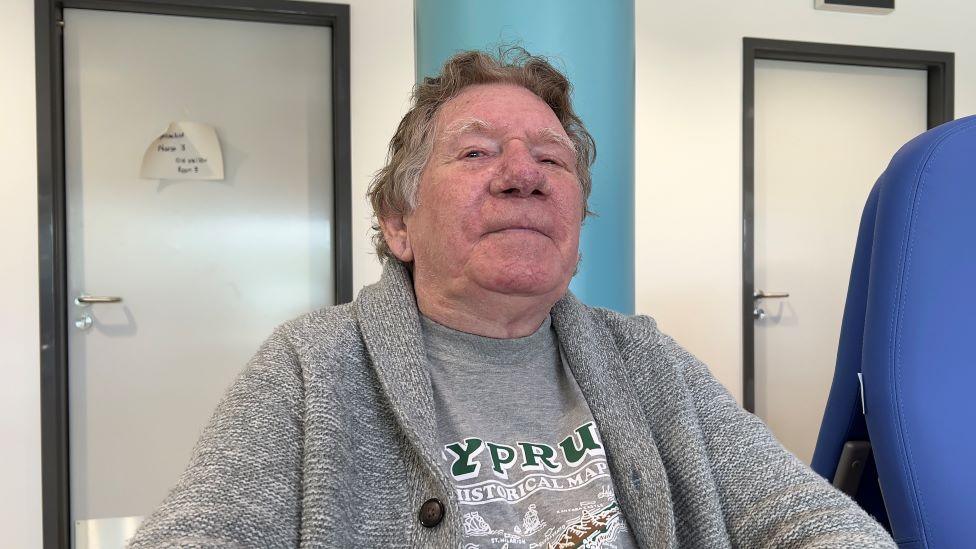
David Bancroft says the twinned hospitals weren't important to him as he just wanted to get treatment wherever possible
David Bancroft , 76, from Clacton in Essex, was transferred from Colchester Hospital to Ipswich to see spinal specialists after he collapsed and broke his back while in hospital in April.
"I just wanted to get it done, no matter where they sent me," he said.
"The transfer was quite good... but I just wanted to get it done; I just want to get back on my feet and normal living".
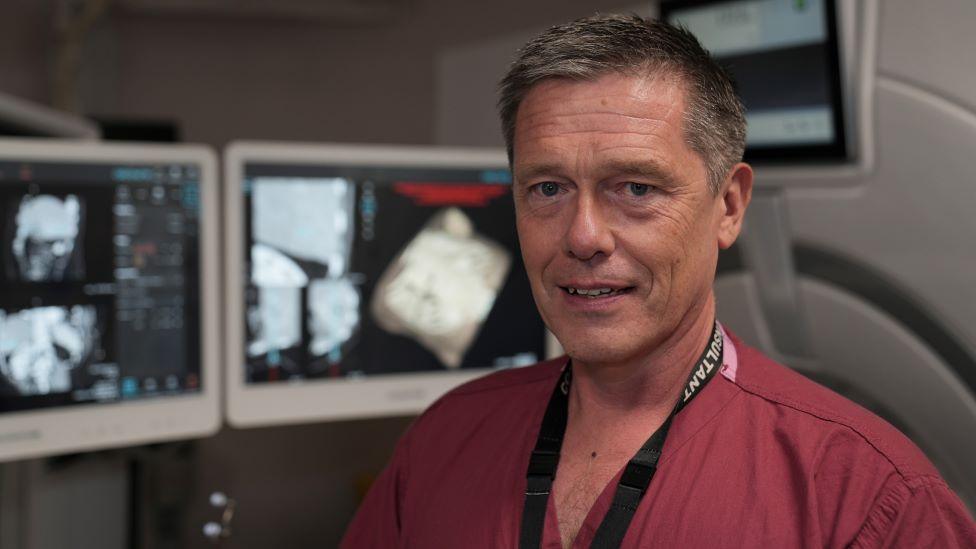
Dr Simon Smith says having more specialised treatments to offer will help attract radiologists during a recruitment crisis.
Dr Simon Smith, a consultant radiologist at Ipswich Hospital, said the merger allowed the hospital to offer more specialist techniques, meaning patients no longer had to travel to Cambridge, Norwich or London.
He said there was a shortage of radiologists - particularly in the east of England - and being a centre offering techniques not usually on offer at smaller hospitals helped make "the place more attractive" in terms of recruitment.

Royal College of Nursing members picketed outside Colchester Hospital earlier in 2023 during the pay dispute

Find BBC News: East of England on Facebook, external, Instagram, external and Twitter, external. If you have a story suggestion email eastofenglandnews@bbc.co.uk, external or get in touch via WhatsApp on 0800 169 1830
- Published26 January 2023
- Published3 February 2023
